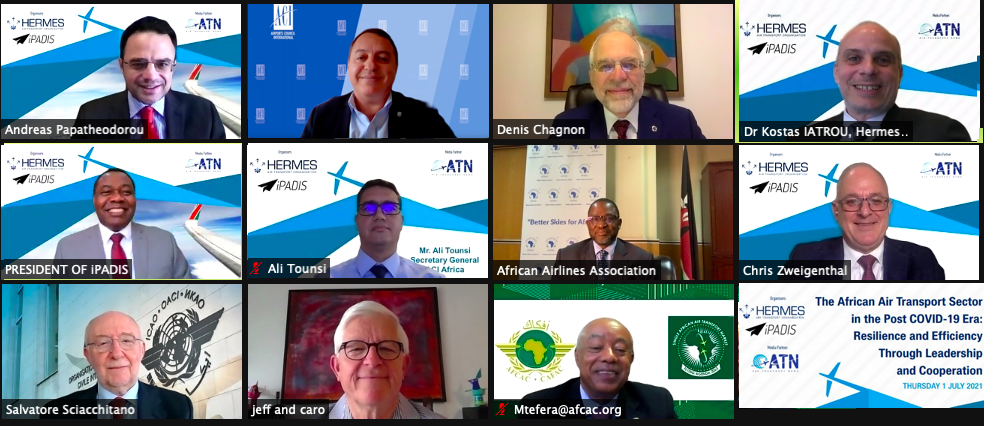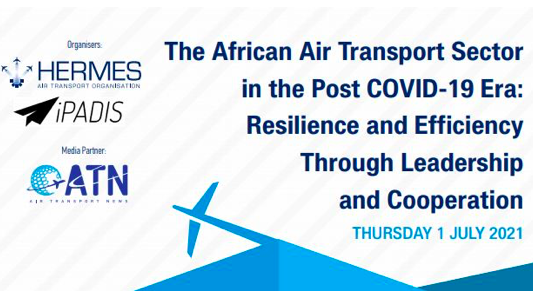Hermes – Air Transport Organisation and iPADIS co-organised an insightful online event regarding the issues, challenges and opportunities which may arise, in the African Air Transport market, in the post COVID-19 era. The panel consisted of several African aviation stakeholders, who shared their opinions regarding the needed actions which will provide resilience and efficiency to the industry through mutual efforts and initiatives.
The event started with the warm welcome of Denis Chagnon, Board Member of IPADIS, who introduced the participants while Professor Andreas Papatheodorou from the University of the Aegean that sponsored the Zoom link for the event underlined the strong trade and tourism links between Greece and many African countries as well as the importance of leadership and cooperation for the resilience of the African and global aviation industry.
Dr. Olumuyiwa Benard Aliu, President of IPADIS, welcomed all the participants and highlighted the great impact of COVID-19 on the global aviation industry. He referred to the severe impact of the pandemic in the African continent while he pointed out that IPADIS is determined to contribute to the resilience of the African tourism and air transport sector by providing guidelines, practical solutions, and long-term strategies.
Next, Dr. Kostas Iatrou, Director General of Hermes – Air Transport Organisation, highlighted the continuous collaboration between the Organisation and several African aviation stakeholders and presented the event contributors and panellists.
In the first keynote address Salvatore Sciacchitano, President of the ICAO Council, who demonstrated the great impact of the pandemic on the global aviation market as well as the even bigger effect on the African market, which suffered a decrease of 68%, compared to the 2019 capacity levels. However, he pointed out that the air freight sector displayed a steep increase and in 2020 the air cargo levels surpassed those of 2019. Moreover, Salvatore Sciacchitano indicated that ICAO projected a loss of more than USD 500 billion on operating revenues for the industry while USD 14 billion relate to the African aviation market. The President of the ICAO Council said that “Deterioration of the economic viability of the aviation sector affects the entire economic ecosystem”, underlining that the industry needs assistance from the governments to boost its financial position and mitigate the negative impacts of the pandemic. He also mentioned the importance of preservation of air connectivity as well as the great impact of aviation on jobs. Moreover, there was a brief introduction of the upcoming ICAO Conference which will be dedicated to the impact of COVID-19 by focusing on the short and long-term Implications for aviation companies, the operational challenges, and the proposed policies for operations in the post COVID-19 era. Finally, Salvatore Sciacchitano focused on the need of standardisation of the procedures regarding the certification of vaccinations as well as the harmonisation and common visions by the policies which will assist a faster recovery. The President once again highlighted that ICAO would continue to provide support and guidelines for a safe, secure, and sustainable restart of the industry.
The second keynote speaker, Luis Felipe de Oliveira, Director General of ACI highlighted the several challenges the airport is currently facing. He identified the unequal distribution of the vaccines as a point of concern; however, he argued that the aviation industry seems to enter to a new phase projecting promising result. The Director General of ACI highlighted safety and security as the top priorities for all airports which will play important role on the recovery of the industry. Also, he mentioned that this global pandemic demands global collaboration between all industry stakeholders as well as government bodies. He recognised CART guidelines as vital for the harmonisation of the processes among the industry while he introduced ACI’s programme on establishing health protocols. He referred to both, local and global challenges, for the airports such as capacity issues, infrastructure, changing business models and regimes. Next, he focused on the African continent and the great potential of the market. He pointed out some of the issues which need to be addressed by the African countries; however, he remained confident that implementing the “no country left behind” vision as well as the establishment of African Open Skies the continent has a bright future.
The Leaders Panel addressed the impact of COVID-19 on the global aviation industry as well as its impact on the African continent. The Panel was moderated by Jeff Poole, President of Hermes – Air Transport Organisation, who referred to the slow vaccination processes and their impact on the recovery of the African air transport sector. He also pointed out that health considerations have damaged air transport despite the advocacy of industry’s stakeholders and that in most cases there were bilateral and national approaches rather than a common strategy. Moreover, he indicated that there is a strong need to build back better and introduce new business models and development through sustainability. The President of Hermes underlined that leadership and cooperation are some of the tools which could restore the confidence of travellers, rebuild the industry, and finally bring resilience. At last, Jeff Poole identified that new measures need to be undertaken; new initiatives must be introduced and that there is a strong need for a change of the existing mind sets.
Tefera Mekonnen Tefera, Secretary General of AFCAC mentioned the unprecedented challenges which COVID-19 has brought to the African aviation industry. He focused his speech on the ways AFCAC is trying to address the challenges and align with the international guidelines. He also mentioned that a great part of this constant transformation includes strategies towards safety, security, sustainable and cooperative actions for the viability of the industry. Tefera Mekonnen Tefera introduced AFCAC’s long term strategy plan, in collaboration with ICAO, to define the main strategies for the future of the organisation as well as its main business plan for the next three years. The Secretary General of AFCAC said that the organisation is closely working with IATA to provide guidelines for African airlines on safety certification processes. At the same time, AFCAC established vital workshops to address ICAO policies on aeronautical charges and fees, which finally resulted to the harmonisation of several processes as well as the removal of several tariff barriers, thus the decrease of costs for the African airlines. Tefera Mekonnen TEFERA concluded by referring to the establishment of a Single African Air Transport market as well as to the strong collaboration between governmental bodies and industry stakeholders.
Abdérahmane Berthe, Secretary General of African Airline Association – AFRAA first highlighted the severe implications of COVID-19 for the African Airlines. He pointed out the major decrease on capacity, traffic as well as revenue losses which is in contrast with the major surge on cargo loads and revenues. Furthermore, he discussed the importance of air transport for the continent as well as the significance of standard procedures harmonisation to face the challenges. He also mentioned that low-speed vaccination processes become threat for the recovery of the industry, and that the expedition of vaccinations is the key to restart the industry. The Secretary General of African Airline Association identified that the future of the African air transport industry demands strong leadership and cooperation both on airline and continental stakeholder basis. The need for a commission to help airlines is as critical. He finalised his speech by suggesting several recommendations for the African airlines such as adoption and rethink of their current business models, operation of cargo flights, restructuring of their fleet and network planning and improvement of connectivity by codeshare agreements.
Chris Zweigenthal, Chief Executive of the Airlines Association of Southern Africa – AASA, focused his speech on the relation between airlines and governments. He admitted that governments applied several restrictions during the pandemic and falsely linked airlines with the spread of COVID-19. He pointed out the different phases on the relationship between governments and airlines on a pre, in and post COVID-19 era. His recommendation was the adoption of a true and strong relationship with the decision making and regulatory bodies. The need for governments to understand the importance of aviation, and vice versa, seems essential. At last, he referred to the several and continuous lockdowns which did not give the opportunity to the airlines to project a stable and sustainable recovery.
Ali Tounsi Secretary General, ACI Africa, presented the situation on behalf of the African airports. He mentioned that there is a steep decline on capacity and revenues for the African airports while at the same time there is great uncertainty due to the lack of coordinated vaccination campaign. Ali Tounsi highlighted the continuous support of ACI towards African airports, by providing guidelines, recovery protocols for safety and efficiency as well as harmonised procedures for health protocols. Furthermore, the Secretary General underlined the role of airports in the establishment of a safe, secure, and sustainable future. Finally, he identified five major challenges, which the African aviation market needs to face to enter the new normality and finally start recovering:
- Need for a dialogue among African governments and aviation stakeholders in order to implement harmonised health and travel protocols
- Viable, Universal and Accessible Covid-19 testing facilities for travellers
- Boost of the vaccination processes
- Relaxation of travel restrictions for fully vaccinated and negative-tested travellers
- Adoption of digital vaccination certificate from all African countries
Next, Jeff Poole asked the participants about the actions which the air transport sector can undertake and the possible sources for leadership in the African region.
Ali Tounsi referred to the tangible actions that need to be followed and the continuous cooperation between the aviation stakeholders and governments. He identified that the ICAO CART guidelines are a great tool but not the solution to the problem. Boost of vaccination processes as well as harmonisation of the procedures are mandatory actions for the African continent. At last, he expressed his thoughts on the fact that slow vaccination processes could have a grave effect on the African region.
Chris Zweigenthal agreed on the fact that the complexity of the aviation sector has created communication problems and that all these stakeholders need to notify governments regarding the impact of their decisions. He expressed his belief that the existing leadership can assist the African aviation sector through standard procedures and proper communications.
Abdérahmane Berthe admitted the complexity of the various systems in the industry, which have brought limited results so far. He identified the need for a dialogue between stakeholders and national authorities, as vital for the future of the industry in the continent. He also recognised the importance of vaccination processes as key for the resilience of air transport sector. Last, he confessed that airlines have limited role on the formulation of the several decisions and asked for their greater cooperation.
Tefera Mekonnen TEFERA introduced the idea that “no country left behind” and asked from governments to support the African aviation market. The financial relief of airlines, airports and service providers is key for their financial viability. Moreover, he referred to the fact that CART guidelines are critical to be followed and he mentioned that the cooperation of the airlines and the reconsideration of their business models are essential for their future viability.
Finally, all participants agreed that stronger leadership and cooperation are the main factors that could ensure the resilience of the industry.
In his concluding remarks, Dr Olumuyiwa Benard Aliu, President of IPADIS, thanked all the participants and pointed out that COVID-19 had a great impact on the African region. He recognised the importance of the CART guidelines and directed all stakeholders towards harmonisation strategies with both the governmental and health authorities. He mentioned that this should be a joint effort which demands strong leadership and cooperation. Finally, he highlighted the significance of the connectivity within the continent, the restructuring of airlines’ business models, the need for the adoption of cargo operations and the promotion of intercontinental and domestic market access.


